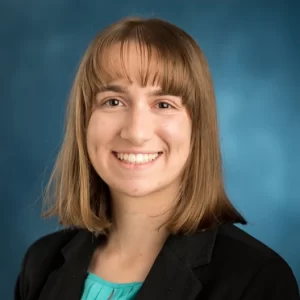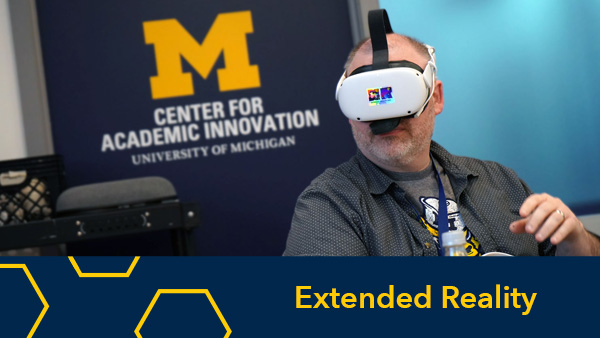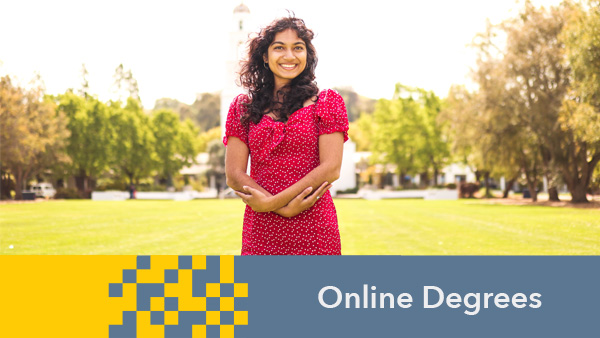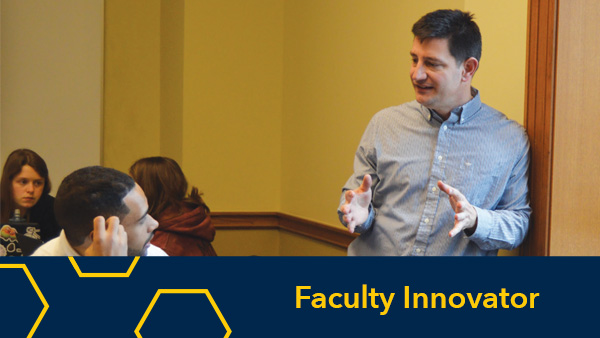This piece originally appeared on the Learning Innovation blog by Edward J. Maloney and Joshua Kim on March 27, 2022.
We’ve been longtime fans of the Center for Academic Innovation at the University of Michigan. CAI’s founding executive director, Associate Vice Provost for Academic Innovation James DeVaney, is a good friend and frequent collaborator. In recent conversations, we’ve learned more about CAI’s collaboration with U-M’s School of Education on the creation of a graduate certificate in learning experience design, a program that parallels our own work in the learning, design and technology master’s degree program at Georgetown University.
We, therefore, were intrigued by the chance to hear more from a student in that program, Katherine Mercieca, who thinks about the intersection of academic and student affairs in her academic and professional life. Inspired by a 2019 “Learning Innovation” blog post about the relationship between learning design and student well-being, Katherine has been investigating the connections between learning design and student affairs in an independent study project. We posed three questions to find out more about the ways she is connecting her academic and professional experiences to challenge learning experience designers to look at their profession through a new lens.
Q: What led you to pursue a graduate certificate in learning experience design at the University of Michigan and a student fellowship at the Center for Academic Innovation?
A: I’ve been with the University of Michigan for a long time, so pursuing graduate work here felt like a natural decision. I earned my B.A. in English and international studies from U-M in 2016. After I graduated, I took a position with the Office of Undergraduate Admissions at U-M, which sparked my passion for higher education. The more I moved up in the office, the more I got involved in staff training and development. I mentored new staff, developed case studies for our annual staff training and created other training materials whenever they were needed. This is where I really felt like I hit my professional stride and began to see myself as a learning professional, although I didn’t have that vocabulary at the time.
If I wanted to advance professionally in higher education, though, I knew I needed to get a master’s degree at some point. My M.A. program through the Center for the Study of Higher and Postsecondary Education offers a part-time option for full-time employees. At the time, I planned on working in admissions until I graduated with my M.A. in a few years so I could earn and save my way through graduate school.
Most people’s best-laid plans, however, were thrown up in the air by the COVID-19 pandemic. I started my master’s in fall 2020 as a part-time student. Then, I learned about the learning experience design (LXD) graduate certificate, which seemed to perfectly complement my professional training experience. This opened up a whole new set of career opportunities I never knew existed, and I knew I had to pursue it. However, there was a catch: a 180-hour residency at CAI. This time-consuming requirement was simply incompatible with my full-time job. I knew I had a decision to make.
Fast-forward to the winter 2021 semester. By March, I made the decision to go full-time with my master’s program. Mere weeks after I made this decision, I received a generous scholarship from CSHPE, and I learned about another opportunity through the Center for Academic Innovation. The online and hybrid programs (OHP) team was hiring an inaugural online student services fellow starting in summer 2021. I’d be helping develop their onboarding course experience, among other essential student services, which matched my student affairs background perfectly. I applied as soon as I found out about the opportunity, received an offer and left admissions in June 2021. I’ve been with the OHP team ever since and have been working in both an OHP and LXD capacity this academic year.
Q: What meaningful connections do you see between student affairs and learning experience design?
A: Both professions put learners first. Obviously, students are at the heart of student affairs practice. Student affairs professionals create meaningful college experiences through advising, housing, campus involvement and other facets of student life. Learning experience designers consider the learner at every stage of the design process. From what the learning outcomes should be, to the learning materials that will best support those outcomes, and types of assessment that will best measure their learning, students are front and center during the design process.
Likewise, both types of professionals are educators, though maybe not in a traditional sense. Learning experience designers shape classroom learning environments, while student affairs professionals help create meaningful extracurricular learning opportunities, or they help students make meaningful connections between their coursework and their personal and professional goals. Academic and career counselors are key to helping students forge these connections, especially when these counselors work in partnership with one another (Ledwith, 2014).
Student affairs professionals are also the stewards of the university’s culture and attitudes toward learning and academic achievement. Do we set high academic expectations? Do we support a more competitive or cooperative learning environment? Student affairs professionals can create programming and other initiatives to answer all these questions and more (Blake, 2007).
Essentially, student affairs and instructional design complement each other.
The deeper I’ve gotten into my coursework, the more I’ve realized that our frameworks of practice are very similar, particularly between advising and learning experience design. For example, there’s a framework called appreciative advising that draws on social constructivist traditions, which involves academic advisors asking “positive, open-ended questions” to help students work toward their goals and get the most out of their educational experiences (Bloom et al., 2013, p. 83). Learning experience designers also borrow from social constructivist practices when they create learning activities such as peer-review assignments or other discussion opportunities.
Socially oriented frameworks are certainly not the only approaches that both professionals can take, however. Rather, they’re tools in a toolbox that can be matched to the appropriate task, learning goal or students’ needs. Advisers use a variety of approaches and theories to support their students and empower them to take ownership over their education. Learning experience designers similarly draw upon a range of theories, frameworks and approaches to create learning outcomes, activities and assessments that comprise a meaningful learning experience.
Q: In what ways might insights and expertise from higher education and student affairs professionals be integrated meaningfully into learning design contexts?
A: First, talk to each other! In my personal observations, student affairs and academic affairs professionals very rarely, if ever, work together, even in areas where there’s clear overlap. I think we could both learn from one another in surprising ways. That being said, I think these partnerships should be created thoughtfully to ensure that we’re building beneficial relationships intentionally (see Magolda, 2005). Student affairs professionals and learning experience designers have limited time and capacity outside of their domains, so that time should be spent wisely. Still, even networking opportunities could help us realize just how much we have in common and how much we can learn from each other.
Also, the more we learn from each other, the more we can tap into each other’s strengths. For example, in my LXD residency, I’m working on a MOOC series about the LXD profession. One of the courses in the series focuses on professional development and identity, and we ran into the question: Who might serve as a good guest speaker? I immediately thought of the career center and career advisers. Sure, we can bring in professional LXDs, but who can better speak to career development, networking and résumé building than the experts themselves?
Second, the more I’ve heard from other learning experience designers, the more I’ve come to view them as advisers to faculty and other subject matter experts. They employ a lot of the same techniques that advisers use in their practice such as active listening, building rapport and helping others build autonomy and self-sufficiency in specific domains. Therefore, I think we could begin to frame learning experience design as a practice of advising or coaching.
Lastly, I would love to see more student affairs professionals in learning experience design. When I started attending my first classes in the LXD certificate program, I thought I was at a disadvantage in comparison to most of my peers, who mostly came from K-12 educational backgrounds and had more formal experience in teaching and curriculum design.
Now, I realize that my background is a real strength. Student affairs professionals not only have the soft skills necessary for working with faculty and design teams, but they also have a sense of the “bigger picture” of higher education.
As I am graduating in April 2022, I am optimistic that the experiences I have gained thus far in my recent professional and academic experiences have prepared me well for a career as a learning professional. I am looking forward to bringing both my student affairs and academic affairs experiences together in new and exciting ways that put learners first.



